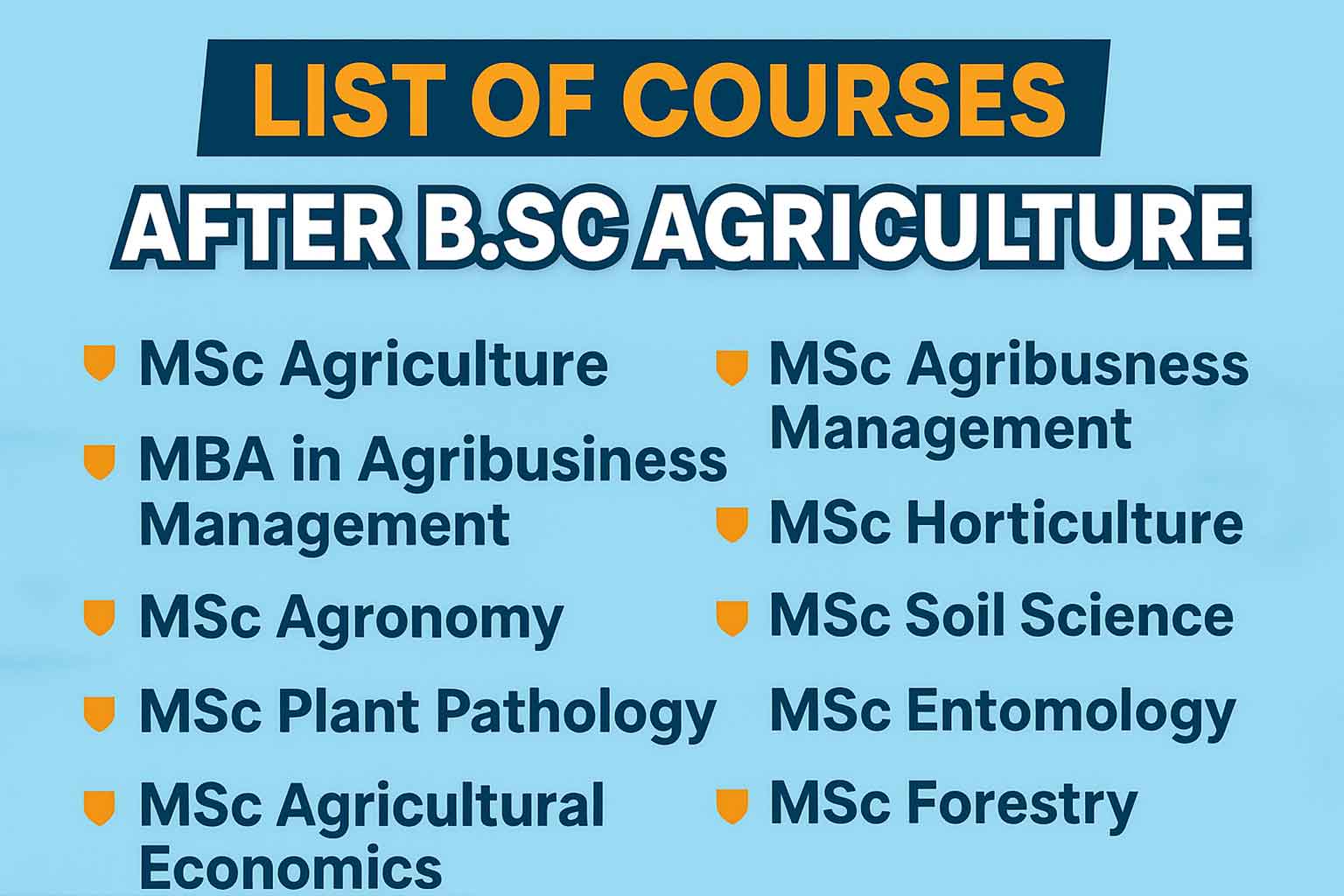Imagine standing in a vast field at dawn, the soil rich and ready, knowing that your next step could shape not just your career but the future of food security for millions. If you’ve just wrapped up your BSc in Agriculture, that sense of possibility is real—and it’s time to channel it into something meaningful. Welcome to CoursesAfter.com, your friendly guide through the world of post-graduation options tailored for ambitious minds like yours. Here, we cut through the noise to spotlight pathways that blend passion with practicality, helping you turn your green-thumb expertise into a thriving profession.
Exploring courses after BSc Agriculture opens doors to advanced studies, specialised skills, and rewarding jobs in a sector that’s evolving faster than ever. With climate challenges, tech innovations like precision farming, and a global push for sustainable practices, the demand for skilled agriculturists is skyrocketing. Whether you’re eyeing research labs, corporate boardrooms, or field leadership, the right course can boost your earning potential and impact. In this guide, we’ll dive into the best picks, from master’s programs to quick certifications, all optimised for your next big move. Let’s get started on cultivating your future.
After BSc Agriculture which courses are the best?
Deciding on the best courses after BSc Agriculture can feel like choosing the perfect seed for your soil—it’s all about matching your interests, skills, and long-term goals. At the same time, there’s no one-size-fits-all answer; a few stand out for their blend of relevance, job prospects, and growth potential in 2025’s dynamic ag sector.
For those passionate about fieldwork and innovation, an MSc in Agronomy tops the list. It dives deep into crop production and soil management, equipping you to tackle real-world issues like climate-resilient farming. If business acumen calls to you, the MBA in Agribusiness Management shines, merging agricultural knowledge with strategic planning for roles in supply chains and exports.
On the practical side, diplomas in organic farming offer quick entry into sustainable niches, ideal if you’re eager to start earning sooner. Ultimately, the “best” boils down to your vibe: research-oriented? Go for MSc specialisations. Leadership-focused? Opt for MBAs. With salaries starting at 4-6 LPA and climbing to 15+ LPA with experience, these paths promise stability and excitement. As we explore further, you’ll see how each aligns with emerging trends like agrotech and global trade.
List of Popular Courses After BSc Agriculture

Diving into higher studies after your BSc can supercharge your expertise, opening avenues in research, policy, and industry. We’ve curated a list of the 20 most popular courses based on enrollment trends, job demand, and versatility. Ranked by popularity, each includes key details to help you decide. These programs typically build on your foundational knowledge, emphasising hands-on projects and industry ties.
MSc Agriculture
A comprehensive postgraduate degree covering advanced crop science, soil health, and sustainable practices—ideal for research aspirants.
- Duration: 2 years
- Eligibility: BSc Agriculture with 50% aggregate
- Career Options: Agronomist, Research Scientist, Farm Consultant, Policy Advisor
- Fees: ₹50,000 – ₹2,00,000
- Salary Range: ₹4 – 12 LPA
MBA in Agribusiness Management
Blends business strategy with agricultural insights, designed for managerial roles in supply chains and exports.
- Duration: 2 years
- Eligibility: BSc Agriculture + entrance exam (CAT/MAT)
- Career Options: Agribusiness Manager, Supply Chain Analyst, Export Specialist, Entrepreneur
- Fees: ₹1,00,000 – ₹5,00,000
- Salary Range: ₹6 – 15 LPA
MSc Horticulture
Focuses on fruit, vegetable, and ornamental plant cultivation, ideal for those interested in high-value crops and landscaping.
- Duration: 2 years
- Eligibility: BSc Agriculture or related with 50% marks
- Career Options: Horticulturist, Plantation Manager, Landscape Designer, Quality Controller
- Fees: ₹40,000 – ₹1,50,000
- Salary Range: ₹3.5 – 10 LPA
MSc Agronomy
Covers crop production techniques and farm management, with emphasis on optimising yields across climates.
- Duration: 2 years
- Eligibility: BSc Agriculture with a minimum 50%
- Career Options: Agronomist, Crop Advisor, Seed Technologist, Extension Officer
- Fees: ₹30,000 – ₹1,00,000
- Salary Range: ₹4 – 11 LPA
MSc Soil Science
Specialisation in soil fertility, conservation, and remediation—vital for sustainable land use and environmental protection.
- Duration: 2 years
- Eligibility: BSc Agriculture or equivalent
- Career Options: Soil Scientist, Environmental Consultant, Land Use Planner, Researcher
- Fees: ₹25,000 – ₹80,000
- Salary Range: ₹4.5 – 12 LPA
MSc Plant Pathology
Focuses on diagnosing and controlling plant diseases to safeguard crops from biotic threats.
- Duration: 2 years
- Eligibility: BSc Agriculture with 50%
- Career Options: Plant Pathologist, Disease Specialist, Biocontrol Expert, Quality Inspector
- Fees: ₹35,000 – ₹1,20,000
- Salary Range: ₹3.8 – 9 LPA
MSc Entomology
Explores insect biology and pest management, crucial for integrated pest control strategies.
- Duration: 2 years
- Eligibility: BSc Agriculture
- Career Options: Entomologist, Pest Control Advisor, Research Associate, IPM Specialist
- Fees: ₹30,000 – ₹90,000
- Salary Range: ₹4 – 10 LPA
MSc Agricultural Economics
Combines economics with farm finance and policy—ideal for market analysis and rural development careers.
- Duration: 2 years
- Eligibility: BSc Agriculture + basic math proficiency
- Career Options: Agri-Economist, Market Analyst, Policy Maker, Financial Advisor
- Fees: ₹40,000 – ₹1,50,000
- Salary Range: ₹5 – 13 LPA
MSc Agricultural Extension
Emphasises farmer education and technology transfer, bridging agricultural research with rural communities.
- Duration: 2 years
- Eligibility: BSc Agriculture
- Career Options: Extension Officer, Community Developer, Training Coordinator, NGO Specialist
- Fees: ₹25,000 – ₹70,000
- Salary Range: ₹3.5 – 8 LPA
MSc Genetics and Plant Breeding
Centres on crop improvement and developing resilient varieties through genetics and biotechnology.
- Duration: 2 years
- Eligibility: BSc Agriculture with a biology focus
- Career Options: Plant Breeder, Geneticist, Seed Developer, Biotech Researcher
- Fees: ₹50,000 – ₹2,00,000
- Salary Range: ₹5 – 14 LPA
MSc Forestry
Focuses on forest management, conservation, and sustainable timber resource use—ideal for ecosystem enthusiasts.
- Duration: 2 years
- Eligibility: BSc Agriculture or Forestry
- Career Options: Forest Officer, Conservationist, Wildlife Manager, Ecologist
- Fees: ₹30,000 – ₹1,00,000
- Salary Range: ₹4 – 9 LPA
MSc Fisheries
Covers aquaculture and fish resource management, tapping into opportunities in the seafood industry.
- Duration: 2 years
- Eligibility: BSc Agriculture or Fisheries
- Career Options: Fisheries Scientist, Aquaculture Manager, Fishery Biologist, Export Consultant
- Fees: ₹40,000 – ₹1,20,000
- Salary Range: ₹3.5 – 10 LPA
MSc Dairy Science
Explores milk production, processing, and quality management—key for careers in the dairy sector.
- Duration: 2 years
- Eligibility: BSc Agriculture or Dairy Tech
- Career Options: Dairy Manager, Food Technologist, Quality Analyst, R&D Specialist
- Fees: ₹20,000 – ₹60,000
- Salary Range: ₹4 – 11 LPA
MSc Food Technology
Integrates food science with preservation and safety techniques, leading to roles in food processing industries.
- Duration: 2 years
- Eligibility: BSc Agriculture or Food Science
- Career Options: Food Technologist, Quality Manager, Product Developer, Safety Officer
- Fees: ₹50,000 – ₹1,50,000
- Salary Range: ₹4.5 – 12 LPA
MTech Agricultural Engineering
Technology-driven program on farm machinery, irrigation, and mechanisation—suited for engineering-focused students.
- Duration: 2 years
- Eligibility: BSc Agriculture + GATE
- Career Options: Agri-Engineer, Irrigation Specialist, Equipment Designer, Project Manager
- Fees: ₹60,000 – ₹2,50,000
- Salary Range: ₹6 – 15 LPA
MSc Environmental Science
Explores agro-environmental impacts and equips graduates for sustainability and policy-related roles.
- Duration: 2 years
- Eligibility: BSc Agriculture
- Career Options: Environmental Consultant, Sustainability Officer, Policy Analyst, Researcher
- Fees: ₹35,000 – ₹1,00,000
- Salary Range: ₹4 – 10 LPA
MSc Biotechnology
Applies biotechnology to agriculture with a focus on genetic engineering and crop enhancement.
- Duration: 2 years
- Eligibility: BSc Agriculture with biotech specialisation
- Career Options: Biotech Researcher, Genetic Engineer, Lab Manager, Innovator
- Fees: ₹70,000 – ₹3,00,000
- Salary Range: ₹5.5 – 14 LPA
MSc Agroecology
Integrates ecology with farming systems to promote holistic, eco-friendly agricultural practices.
- Duration: 2 years
- Eligibility: BSc Agriculture
- Career Options: Agroecologist, Sustainable Farm Planner, Advisor, Educator
- Fees: ₹40,000 – ₹1,20,000
- Salary Range: ₹4 – 9 LPA
MSc Sustainable Agriculture
Emphasises regenerative practices and addresses global food security challenges.
- Duration: 2 years
- Eligibility: BSc Agriculture
- Career Options: Sustainability Expert, Farm Consultant, Policy Developer, Trainer
- Fees: ₹30,000 – ₹90,000
- Salary Range: ₹3.8 – 10 LPA
PhD in Agriculture
Advanced research program for future academicians, innovators, and thought leaders in agriculture.
- Duration: 3 – 5 years
- Eligibility: MSc Agriculture + entrance exam
- Career Options: Professor, Senior Researcher, Consultant, Director
- Fees: ₹20,000 – ₹1,00,000
- Salary Range: ₹8 – 20 LPA
Diploma and Certification Courses After BSc Agriculture
If you’re looking for shorter, skill-focused paths to upskill without a full degree commitment, diplomas and certifications after BSc Agriculture are game-changers. These 15 popular options, ranked by demand, offer flexibility—often online or part-time—and quick ROI through specialised roles. They’re perfect for mid-career boosts or niche expertise in emerging areas, such as organic and precision agriculture.
Diploma in Organic Farming
Hands-on training in chemical-free cultivation and certification standards.
- Duration: 6–12 months
- Eligibility: BSc Agriculture
- Career Options: Organic Farmer, Certifier, Consultant
- Fees: ₹10,000 – ₹30,000
- Salary Range: ₹2.5 – 6 LPA
Diploma in Horticulture
Covers advanced plant propagation and garden management.
- Duration: 1 year
- Eligibility: BSc Agriculture
- Career Options: Horticulture Supervisor, Nursery Manager
- Fees: ₹15,000 – ₹40,000
- Salary Range: ₹2.8 – 5.5 LPA
Diploma in Agribusiness Management
Short-term program on farm-to-market strategies and entrepreneurship.
- Duration: 6 months
- Eligibility: BSc Agriculture
- Career Options: Agri-Entrepreneur, Sales Executive
- Fees: ₹20,000 – ₹50,000
- Salary Range: ₹3 – 7 LPA
Certificate in Agricultural Marketing
Focuses on market trends, pricing strategies, and digital sales platforms.
- Duration: 3–6 months
- Eligibility: BSc Agriculture
- Career Options: Market Analyst, Trader
- Fees: ₹5,000 – ₹15,000
- Salary Range: ₹2.5 – 5 LPA
Diploma in Dairy Technology
Practical skills in milk processing, hygiene, and product handling.
- Duration: 1 year
- Eligibility: BSc Agriculture
- Career Options: Dairy Technician, Processor
- Fees: ₹10,000 – ₹25,000
- Salary Range: ₹2.7 – 6 LPA
Certificate in Soil Management
Covers soil testing techniques and fertility improvement practices.
- Duration: 3 months
- Eligibility: BSc Agriculture
- Career Options: Soil Tester, Advisor
- Fees: ₹8,000 – ₹20,000
- Salary Range: ₹2.2 – 4.5 LPA
Diploma in Sericulture
Covers silk production processes from mulberry cultivation to reeling.
- Duration: 6–12 months
- Eligibility: BSc Agriculture
- Career Options: Sericulturist, Cocoon Trader
- Fees: ₹12,000 – ₹35,000
- Salary Range: ₹2.5 – 5.5 LPA
Certificate in Food Safety and Quality
Focuses on food safety standards, handling, and compliance procedures.
- Duration: 3 months
- Eligibility: BSc Agriculture
- Career Options: Quality Inspector, Auditor
- Fees: ₹6,000 – ₹18,000
- Salary Range: ₹2.8 – 5 LPA
Diploma in Forestry
Introduces woodland management, forestry practices, and conservation basics.
- Duration: 1 year
- Eligibility: BSc Agriculture
- Career Options: Forest Guard, Planner
- Fees: ₹15,000 – ₹40,000
- Salary Range: ₹3 – 6 LPA
Certificate in Plant Protection
Covers pest scouting techniques and eco-friendly control measures.
- Duration: 3–6 months
- Eligibility: BSc Agriculture
- Career Options: Protection Specialist, Scout
- Fees: ₹7,000 – ₹20,000
- Salary Range: ₹2.3 – 4.8 LPA
Diploma in Aquaculture
Provides training in fish farming systems and water management.
- Duration: 6 months
- Eligibility: BSc Agriculture
- Career Options: Aqua Farmer, Technician
- Fees: ₹10,000 – ₹30,000
- Salary Range: ₹2.6 – 5.5 LPA
Certificate in Precision Agriculture
Application of drones, GIS, and technology for efficient farming practices.
- Duration: 3 months
- Eligibility: BSc Agriculture
- Career Options: Precision Tech Operator, Data Analyst
- Fees: ₹15,000 – ₹40,000
- Salary Range: ₹3.5 – 7 LPA
Diploma in Crop Production
Focuses on advanced cultivation methods for maximising farm yields.
- Duration: 1 year
- Eligibility: BSc Agriculture
- Career Options: Crop Supervisor, Yield Optimiser
- Fees: ₹12,000 – ₹35,000
- Salary Range: ₹2.8 – 6 LPA
Certificate in Agricultural Finance
Introduces agricultural loans, insurance schemes, and risk management.
- Duration: 3 months
- Eligibility: BSc Agriculture
- Career Options: Finance Advisor, Loan Officer
- Fees: ₹5,000 – ₹15,000
- Salary Range: ₹3 – 6.5 LPA
Post Graduate Diploma in Rural Management
Comprehensive program on rural development, governance, and community projects.
- Duration: 1 year
- Eligibility: BSc Agriculture
- Career Options: Rural Manager, NGO Coordinator
- Fees: ₹25,000 – ₹60,000
- Salary Range: ₹4 – 8 LPA
These bite-sized programs can be completed alongside jobs, often leading to 20-30% salary hikes. They’re a smart bridge to specialised careers in India’s burgeoning rural economy.
Courses After BSc Agriculture with fees
To make your choice easier, here’s a snapshot of popular courses ranked by enrollment popularity, highlighting average annual fees across Indian institutions. Fees vary by public vs. private setups—government colleges keep it affordable, while privates add premium facilities. Use this table to budget wisely.
| Subsidised in agri unis | Average Annual Fees (₹) | Notes |
|---|---|---|
| MSc Agriculture | 50,000 – 2,00,000 | Lower in state unis like PAU |
| MBA Agribusiness Management | 1,00,000 – 5,00,000 | Includes entrance coaching |
| MSc Horticulture | 40,000 – 1,50,000 | Subsidized in agri unis |
| MSc Agronomy | 30,000 – 1,00,000 | Affordable govt options |
| MSc Soil Science | 25,000 – 80,000 | Lab-focused, variable |
| Diploma in Organic Farming | 10,000 – 30,000 | Often online, low-cost |
| MSc Plant Pathology | 35,000 – 1,20,000 | Research grants available |
| Certificate in Precision Agriculture | 15,000 – 40,000 | Tech-integrated |
| MSc Agricultural Economics | 40,000 – 1,50,000 | Policy electives |
| Diploma in Agribusiness Management | 20,000 – 50,000 | Short-term value |
Scholarships from ICAR can slash these by 50% for meritorious students—always check eligibility.
Top Courses After BSc Agriculture with Salary
Salary potential is a big draw, with entry-level roles starting modestly but scaling fast through experience and certifications. Below are the top 10 courses by popularity, paired with realistic salary ranges post-completion (freshers to 5+ years). Data reflects 2025 trends in India, influenced by location and sector.
| Course | Salary Range (LPA) | Key Factors |
|---|---|---|
| MSc Agriculture | 4 – 12 | Govt jobs boost to 9+ |
| MBA Agribusiness Management | 6 – 15 | Corporate roles highest |
| MSc Horticulture | 3.5 – 10 | Exports add premiums |
| MSc Agronomy | 4 – 11 | Field expertise pays |
| MSc Soil Science | 4.5 – 12 | Consulting edges up |
| MTech Agricultural Engineering | 6 – 15 | Tech demand surges |
| MSc Food Technology | 4.5 – 12 | FMCG giants hire |
| Diploma in Precision Agriculture | 3.5 – 7 | Startup opportunities |
| MSc Genetics and Plant Breeding | 5 – 14 | R&D incentives |
| PhD in Agriculture | 8 – 20 | Academia + grants |
Pro tip: Pairing with skills like data analytics can add 2-3 LPA right away.
Top Universities & Colleges Offering Courses After BSc Agriculture
Choosing the right institution amplifies your learning and networks. India’s top spots for post-BSc Agriculture courses boast ICAR accreditation, cutting-edge labs, and placement cells tied into ag giants like ITC and NABARD. Here’s a curated list of standouts, focusing on those excelling in higher studies and diplomas.
- Indian Agricultural Research Institute (IARI), New Delhi: Premier for MSc and PhD programs in agronomy and plant breeding. Known for research fellowships and 90% placement in government roles.
- Punjab Agricultural University (PAU), Ludhiana: A hub for MSc Horticulture and Soil Science, with affordable fees and strong industry links. Alumni lead in Punjab’s green revolution 2.0.
- G.B. Pant University of Agriculture and Technology, Pantnagar: Ideal for MBA Agribusiness and Forestry diplomas. Features on-campus farms for practicals and international exchanges.
- Tamil Nadu Agricultural University (TNAU), Coimbatore: Tops for MSc Fisheries and Food Tech, with tropical crop focus. Offers scholarships and ties to spice exports.
- Chaudhary Charan Singh Haryana Agricultural University (CCSHAU), Hisar: Great for Entomology and Extension courses, emphasising rural outreach. High ROI with 85% employability.
- Indira Gandhi Krishi Vishwavidyalaya (IGKV), Raipur: Strong in Dairy Science and Organic Farming certificates, suited for central India aspirants. Includes tribal agri modules.
- Acharya N.G. Ranga Agricultural University (ANGRAU), Guntur: Excels in Agronomy and Precision Ag diplomas, with Andhra’s coastal focus. Affordable and placement-driven.
- Mahatma Phule Krishi Vidyapeeth (MPKV), Rahuri: Maharashtra’s pick for Plant Pathology and Economics, boasting biotech labs and farmer incubators.
These institutions prioritise holistic development, from seminars with experts to startup incubators. Visit campuses virtually or apply via CUET-PG for 2025 intakes—deadlines loom in October.
Conclusion
As you stand at this crossroads after your BSc Agriculture, remember: the best course isn’t just about the credential—it’s the one that ignites your curiosity and aligns with your vision for a greener world. From the research depths of an MSc to the entrepreneurial spark of an agribusiness diploma, each path we’ve explored equips you to thrive in an industry projected to hit ₹30 lakh crore by 2027.
At CoursesAfter.com, we’re here cheering you on, with resources to simplify applications and career mapping. Take that first step—research, reflect, apply—and watch your expertise bloom into lasting impact. What’s your next harvest? Share in the comments; let’s grow together.

